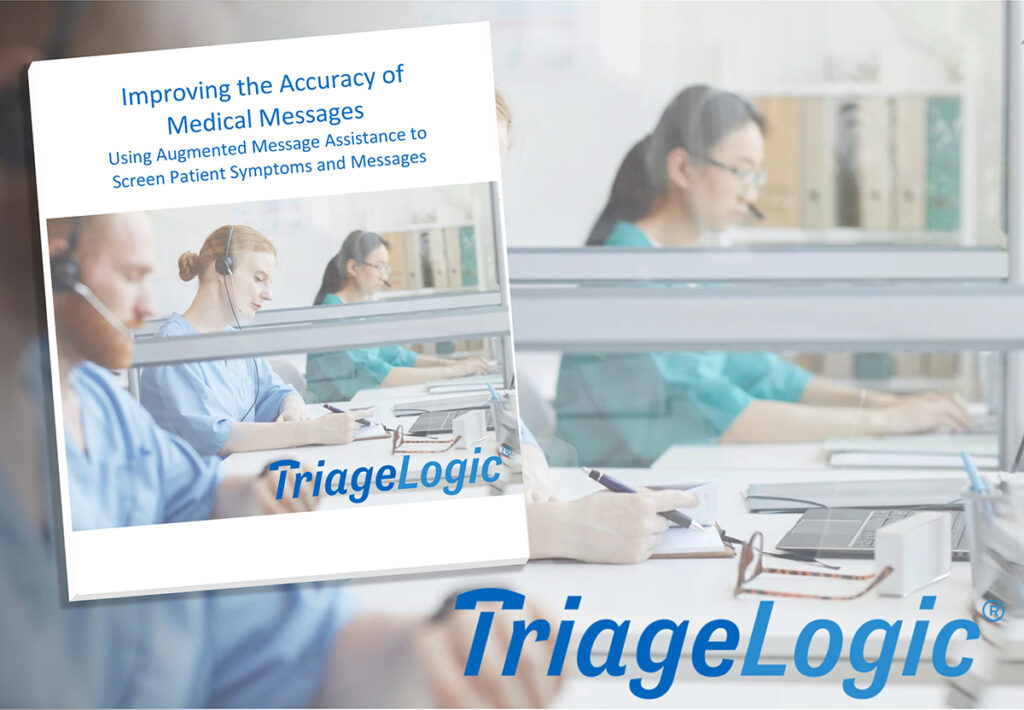TriageLogic has released a white paper that shares data they’ve compiled about the use of artificial intelligence (AI) and augmentation to benefit medical message intake. Normally, when patients call their providers, they’re first greeted by nonclinical operators, like front desk agents or call center representatives. These operators determine the reasons why patients are calling, and forward those messages to the appropriate nurses or providers for review. In many cases, triage nurses are responsible for vetting these messages and determining how urgent they are before calling patients back. When messages are inaccurate, it can potentially delay care and lead to poor health outcomes.
MedMessage Assist (MMA) is TriageLogic’s augmented intelligence-based module that has already demonstrated itself to be a remarkable tool for nonclinical operators and their performance. Where some answering services were seeing intake errors as much as 40 percent of the time, MedMessage was able to get that number down to less than 1 percent — better than any training course has been able to provide. Plus, it only takes about 15 seconds to collect additional information.
Does this mean that nonclinical operators are no longer needed? Hardly, says Dr. Charu Raheja, CEO of TriageLogic. “The goal of MedMessage Assist has always been about making it easier for nonclinical operators to do their jobs well, not replace them. By some estimates, nonclinical staff account for half of all healthcare workers, and are shown to be vital to any practice’s care coordination. What matters is giving them the best tools to thrive in their roles, and ultimately pave the way for exceptional patient outcomes.”
So how does MedMessage work? TriageLogic explains that this module can be integrated with an existing health management system to analyze the text that nonclinical operators type while they’re listening to patient callers. MMA will then prompt operators with one or more questions for them to ask their patients when the symptoms described warrant additional information to determine their severity. In this manner, messages are as detailed as possible for providers and triage nurses to identify the urgency of each call.
“We’ve seen how well this has worked for Southern Voices,” notes Dr. Raheja, “and we’ve already received several excited inquiries from other clients who are ready to try it out with their teams.”
Part of spreading the word about MedMessage’s success includes past and future teleservice events for Dr. Ravi Raheja, CTO at TriageLogic. He previously attended the NAEO Conference in New Orleans back in March, and is currently scheduled to hold a demonstration about AI training performance with David Lawson, CEO of Call Simulator, at the 32nd Annual Conference for the Healthcare Contact Center Times (HCCT) in Atlanta this June. (Simultaneously, Dr. Raheja will be attending the ATSI Conference also held in Atlanta that week.)
Providers are encouraged to contact TriageLogic to learn more about MedMessage Assist and how to deliver more accurate messages. Following a demonstration, this service can be up and running within a day.
About TriageLogic
TriageLogic is a URAC-accredited, physician-led provider of top-quality nurse telehealth technology, remote patient monitoring, and medical call center solutions. Founded in 2007, the TriageLogic Group now serves more than 22,000 physicians and covers over 42 million lives nationwide.





